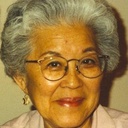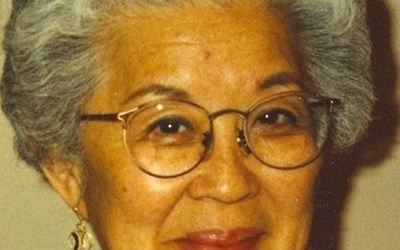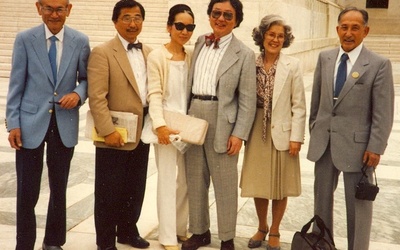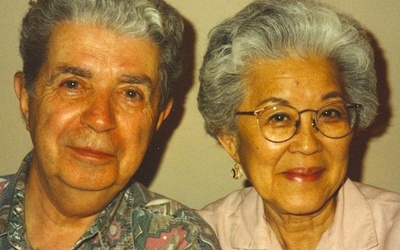
Aiko Herzig-Yoshinaga
Aiko Herzig-Yoshinaga é uma figura icônica entre estudantes, acadêmicos e ativistas Nikkei (nipo-americanos). Junto com outros 110 mil nikkeis na Costa Oeste, Aiko passou a Segunda Guerra Mundial em três campos de concentração: Manzanar na Califórnia, Jerome e Rohwer no Arkansas. Ela se reassentou na cidade de Nova York, onde se envolveu com o Asian Americans for Action. Mais tarde, ela se mudou para a Virgínia, perto dos Arquivos Nacionais em Washington, DC. Em 1981, ela foi contratada como pesquisadora principal da Comissão de Relocação e Internamento de Civis em Tempo de Guerra (CWRIC).
Aiko e seu marido, Jack Herzig, desempenharam um papel fundamental no movimento de reparação através de suas pesquisas no Arquivo Nacional. Os documentos que encontraram também foram fundamentais nos casos coram nobis que anularam as condenações de Fred Korematsu e Gordon Hirabayashi durante a guerra. Eles conduziram uma pesquisa primária de documentos oficiais para o Conselho Nacional de Reparação Nipo-Americana na ação coletiva William Hohri et.al., vs EUA . Aiko também trabalhou para o Gabinete de Administração de Reparações do Departamento de Justiça para ajudar a identificar indivíduos na comunidade Nikkei elegíveis para o pedido de desculpas presidencial e pagamento de reparação.
Por mais de uma década, Aiko compilou e compartilhou uma lista crescente de eufemismos que obscurecem, em vez de revelar, o que realmente aconteceu durante a diáspora Nikkei e a experiência do gulag na Segunda Guerra Mundial. Esse documento foi ampliado para incluir uma breve história pessoal que analisa sua evolução de ex-presidiária e dona de casa ingênua a cidadã preocupada e pesquisadora do CWRIC. Um glossário de termos relacionados com a diáspora-gulag Nikkei durante a guerra inclui eufemismos que precisam de ser substituídos e recomendações para uma nomenclatura mais precisa sobre o assunto.
Ela faleceu em julho de 2018 aos 93 anos.
Atualizado em julho de 2018
Stories from This Author
WORDS CAN LIE OR CLARIFY: Terminology of the World War II Incarceration of Japanese Americans* - Part 5
2 de Março de 2010 • Aiko Herzig-Yoshinaga
Read Part 4 >> While a major controversy between the Nikkei and Jewish communities had been resolved, no such consensus emerged in responses to the JANM’s call for debate among its board members, staff, scholarly advisory group, and volunteers. Some suggested capitulating to the early warnings from the National Park Service, such as JANM board member Grant Ujifusa, who favored dropping “concentration camps” from the title for fear of having the exhibit rejected. But others, including this writer, sent indignant …
WORDS CAN LIE OR CLARIFY: Terminology of the World War II Incarceration of Japanese Americans* - Part 4
23 de Fevereiro de 2010 • Aiko Herzig-Yoshinaga
Read Part 3 >> Witness to a movement in the making Professor Daniels’ admonition resonated among scholars and Nikkei community activists. A “Resolution Regarding Terminology” was adopted by the Civil Liberties Public Education Fund (CLPEF)–a body created in response to one of the recommendations of the Civil Liberties Act of August 10, 1988. The CLPEF resolution states that: In the spirit of its mission, CLPEF Board is taking this opportunity to encourage the public, academia and governmental agencies to begin …
WORDS CAN LIE OR CLARIFY: Terminology of the World War II Incarceration of Japanese Americans* - Part 3
16 de Fevereiro de 2010 • Aiko Herzig-Yoshinaga
Read Part 2 >> Influenced and inspired by others A powerful statement was submitted to the CWRIC during a public hearing in San Francisco on August 13, 1981, by Raymond Okamura, an historical revisionist and activist. Okamura’s 1981 statement to the CWRIC was a compelling review of euphemisms, such as “relocation,” “evacuation,” and other terms that were identical to those on my growing “Work in Progress” list. A year later, his concerns were shared with a broader audience when his …
WORDS CAN LIE OR CLARIFY: Terminology of the World War II Incarceration of Japanese Americans* - Part 2
9 de Fevereiro de 2010 • Aiko Herzig-Yoshinaga
Read Part 1 >> Naive housewife evolves as concerned citizen and political activist It was when my daughter Lisa was in high school, during the turbulent years of the Vietnam war and simultaneous demands for civil rights and social justice at home, that I began to think of words that reflected puzzling contradictions between events as they actually happened versus the words that were used to describe them. We discussed the current news and read of U.S. military press officers …
WORDS CAN LIE OR CLARIFY: Terminology of the World War II Incarceration of Japanese Americans* - Part 1
2 de Fevereiro de 2010 • Aiko Herzig-Yoshinaga
On July 9, 1981, I submitted a memorandum on the subject “Use of term ‘concentration camps’” to the executive director of the Commission on Wartime Relocation and Internment of Civilians (CWRIC). At that time, I was a member of the research staff of the CWRIC. My memo began with this summary of my findings: A search of archival documents reveals that most government authorities, Congressional officials, as well as the public at large, referred to the 1942-46 “relocation centers” as …




